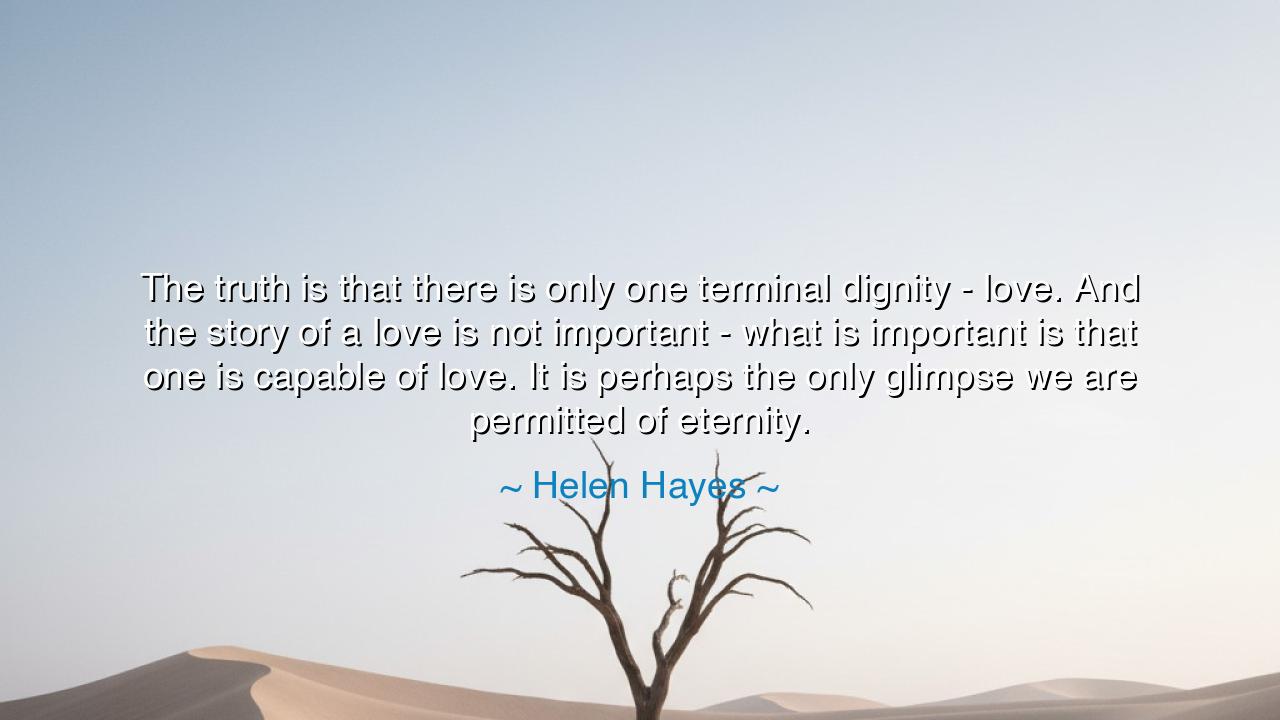
The truth is that there is only one terminal dignity - love. And
The truth is that there is only one terminal dignity - love. And the story of a love is not important - what is important is that one is capable of love. It is perhaps the only glimpse we are permitted of eternity.






When Helen Hayes wrote, “The truth is that there is only one terminal dignity — love. And the story of a love is not important — what is important is that one is capable of love. It is perhaps the only glimpse we are permitted of eternity,” she spoke as one who had looked upon both the beauty and the sorrow of life and found, at its heart, a single immortal truth. Hayes, the “First Lady of American Theater,” had known fame and triumph, but also loss — including the death of her husband and her beloved daughter. From those depths came this radiant wisdom: that all achievements fade, all stories end, all bodies perish — but love, pure and enduring, is the only thing that grants the soul dignity in the face of mortality.
To call love the terminal dignity is to say that it is the one honor that death cannot strip away. Wealth, power, beauty — all these crumble in the march of time. But love, even when unfulfilled, even when broken, transforms the soul that feels it. The person who has truly loved, and allowed themselves to be vulnerable in that love, stands ennobled beyond circumstance. For love is not a possession, but a condition of being — the only one that reaches beyond the grave. Hayes’s words remind us that to love is not merely to live; it is to touch eternity itself, if only for a breath.
The origin of this quote lies not in philosophy, but in Hayes’s own lived experience. She was a woman who saw the stages of life as acts in a grand play — some filled with laughter, others with grief. When her daughter, Mary, died of polio, Hayes said she felt her world collapse, yet through the pain, she discovered something indestructible: her capacity to love had not died with her child. It endured, quietly, eternally, as if some divine spark within her refused to go out. That realization — that love survives loss — became her testament. It was not the story of her love that mattered, but that she was capable of it, that she had known that sacred fire at all.
The ancients, too, understood this truth. In every sacred text, love is the bridge between the mortal and the divine. The Greeks spoke of agape, the selfless love that links humans to gods. The Christians declared that “God is love,” and through it, the soul attains eternal life. Even the poets of old — from Dante seeking Beatrice to Rumi longing for the Beloved — saw love not as emotion but as immortality itself. To love is to step outside the boundaries of time. For in that moment of pure devotion, when the self dissolves into care for another, we glimpse what eternity feels like: limitless, wordless, whole.
Consider the story of Corrie ten Boom, who endured the horrors of a Nazi concentration camp yet emerged with her heart unbroken. When she met one of the guards who had tormented her, she found she could not forgive him — until, in prayer, she felt a surge of love that was not her own, a divine strength flowing through her. She extended her hand, forgave him, and in that moment, she said, she felt eternity touch the world. This is what Hayes meant: love is not the story we tell; it is the power that transcends the story — the eternal rising from the ashes of the temporary.
Love is, in truth, the final victory over despair. Even when it fails to save the body, it saves the spirit. To love, even once, is to prove that the heart has the power to reach beyond itself — to connect, to heal, to create beauty where none existed before. When Hayes said that the story of love is not important, she meant that love’s true worth lies not in how it begins or ends, but in its very existence. Whether it is fulfilled or lost, returned or rejected, it leaves its mark upon the soul. The one who has loved has already triumphed over the emptiness of a loveless life.
So, my child, remember this sacred teaching: do not measure love by outcome, but by courage. Love without fear of its ending, for endings do not touch its essence. Do not seek perfection in the story of love, but presence in its moment. To love is to live twice — once in time, and once beyond it. When you love, you participate in the eternal rhythm of creation; you awaken the divine within you that mirrors the divine in all. Love, then, is not merely life’s reward — it is life’s purpose.
Thus, as Helen Hayes reminds us, “There is only one terminal dignity — love.” All else fades into the dust of history, but love remains — the unseen thread binding mortal hearts to the infinite. When all is said and done, your name will be forgotten, your works will crumble, your body will rest — but the love you have given and received will echo beyond the grave. For love is not the end of the story. It is the part of you that cannot die — your one true glimpse of eternity.






AAdministratorAdministrator
Welcome, honored guests. Please leave a comment, we will respond soon